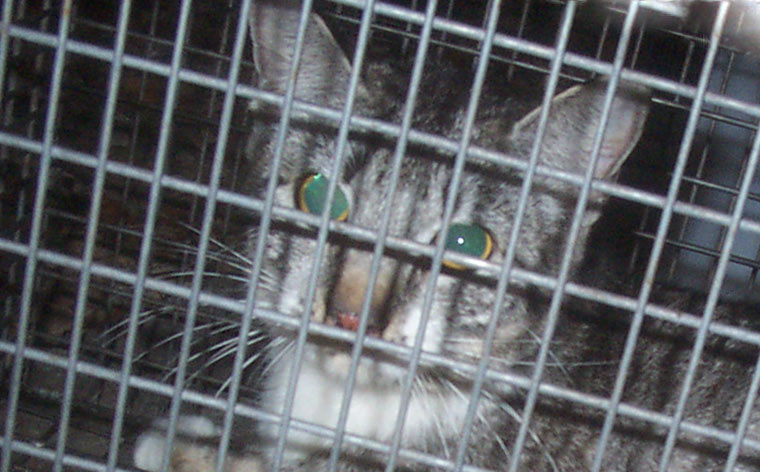-
info@aaanimalcontrol.com
Call us for help in your town
Humane Wildlife Education
How to Keep Away Stray Cats
Need wildlife removal in your hometown? We service over 500 USA locations! Click here to hire us in your town and check prices - updated for year 2020.
Stray cats can be so much more than just a pain the backside to the average homeowner. This is what many “pet owners” don't realize when they kick their beloved furry friends out on the streets to fend for themselves, which is often what happens when cats find themselves homeless. Some of them run away, of course, but neglected pets are a massive part of the stray cat problem in North America.

The first thing you should stop doing when you have a stray cat problem is feeding them. I know they look tiny and scrawny and undernourished, but the more you feed them, the more they'll come back. That means more disease-spreading feces lying around in your back yard, as well as more fights with cats in the neighborhood. The other thing you'll need to remember is that most pet owners who willingly kick their pets out probably won't have had them vaccinated as a kitten, making them more prone to picking up and carrying, as well as passing on disease. It takes one cat fight between your well cared for cat and a stray cat for some serious damage to be done, in terms of physical injuries as well as the transmission of disease.
The bad news is, cats are unpredictable. In fact, they're one of the worst creatures when it comes to unpredictability. Many stray cats repellents or deterrents work very little, or not at all. There are plenty of things you can try, and you will generally find you have the best results when you combine multiple methods, rather than focusing all of your attentions on just the one.
Chicken wire can be used to cover the areas those stray cats are using as an outdoor kitty litter box. If one planter in your back yard is continually being used as a litter box, cover the area with chicken wire to add a temporary cage, of sorts. The cats can't get to the area, therefore, they'll stop pooping there.
If you have mice or rats, attend to that problem too. Even though they're outside, they could still be causing you problems, particularly where stray cats are concerned. These cats need to grab all the food they can, and if you have plenty of rodents in your back yard, it won't be long before you find stray cats there, as well as other wild animals too — raccoons, for example, or maybe even opossums. Snakes follow the trail of rodents too … Had you considered that?
There are some plants which you can add to your garden to repel cats, but we advise you take these measures with the proverbial pinch of salt. It's reported that cats don't like the smell of certain plants much, including the lavender plant. This beautiful and fragrant flower has a habit of attracting bees and wasps, however, so you will need to think about the repercussions of whatever approach you take.
Electric wire fencing is becoming a rather popular option when it comes to deterring a number of wild animals from your land, including stray cats. This is a rather extreme method to take, however, especially if the problem is only a relatively small one. These electric wire fence systems can be expensive to buy, install and run, and will also more than likely require some sort of maintenance work done to them. On top of that, it might not be the best approach to take if you'd rather not electric shock the wildlife in your local area.
Sprinklers are another great approach to take when you have stray cats, and a number of other wild critters too. Most animals don't enjoy being squirted with a cool burst of water out of the blue, and you can get these set up so that they come on, on a timer system.
Commercial cat repellents usually don't work anywhere near as well as everyone would lead you to believe, but some predatory fluid repellents, such as eviction fluid, could work. If a cat believes a male raccoon or fox were hanging around, for example, it might be more inclined to slink off into the sunset.
For more information, you may want to click on one of these guides that I wrote:
How To Guide: Who should I hire? - What questions to ask, to look for, who NOT to hire.
How To Guide: do it yourself! - Advice on saving money by doing wildlife removal yourself.
Guide: How much does wildlife removal cost? - Analysis of wildlife control prices.
animals in the attic
noises in the attic


















